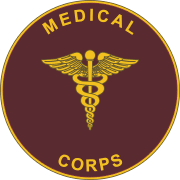 |
| U.S. Army Medical Badge, 1902 |
Many resources are available to read about in general how to prepare for an interview
How To Prepare For Your Residency Interview
The first step is to gather background information about your program. Possible sources of information include classmates who have interview there, friends already at the program or from prior years that may have interview there, and mentors/advisors in the field. You can also consult bulletin boards online where many applicants routinely post about their experiences (like studentdoc.com, auntminnie.com for radiology, or uncleharvey.com for neurosurgery). Lastly, consider the programs themselves. They are great resources about technical details such as the structure of rotations or board pass rates. However, take non-objective information they provide with a grain of salt because they have an obvious strong bias to present themselves in a favorable light.
After learning about the program in general, try to find out more about your interviewers. You may politely inquire with the program coordinator, but not all programs release interviewer names ahead of time. If you find out their names, try doing a search on the program site to find out more about their areas of interest. Also look them up on PubMed to find out what their research interests are. Focusing on areas of common interest can help you stand out during the interview season. Another good resource is looking up the interviewer's CV - you may find out that you share a love for comedic movies or archery or ultrasonography!
Lastly, ask around! Word-of-mouth about interviewers and interview days can be the best gauge of what to expect not only from the day but from the program as a whole. Be especially mindful of programs where the program director is about to leave or has just changed. The PD can significantly affect the culture and structure of a program so try to find out more about the new PD's philosophy on resident education.
Ultimately, knowledge is power, so the more you know about the program, the more confident you can be going into your interview. And remember, just like Obama's grandfather told him
Scrub Notes Residency Interview Tips Series
No comments:
Post a Comment